人教版(2019)必修第一册Unit5 Languages around the world单词课件(94张ppt)
文档属性
| 名称 | 人教版(2019)必修第一册Unit5 Languages around the world单词课件(94张ppt) | 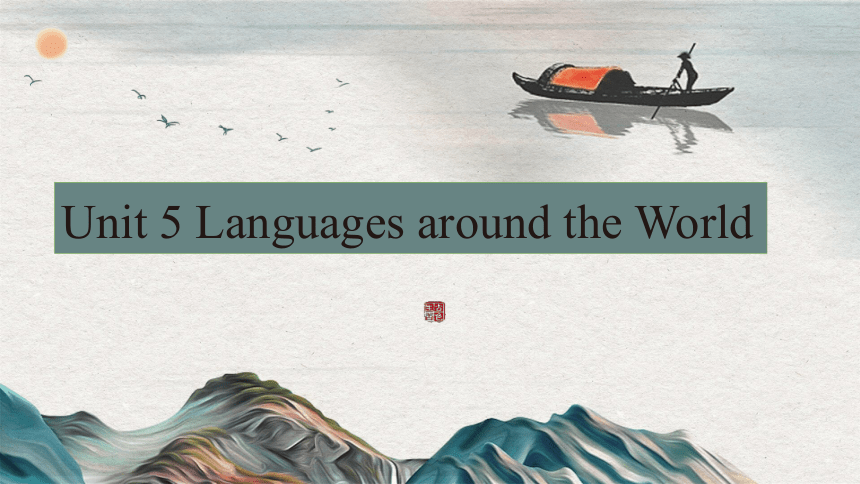 | |
| 格式 | zip | ||
| 文件大小 | 3.4MB | ||
| 资源类型 | 教案 | ||
| 版本资源 | 人教版(2019) | ||
| 科目 | 英语 | ||
| 更新时间 | 2022-05-11 20:49:09 | ||
图片预览


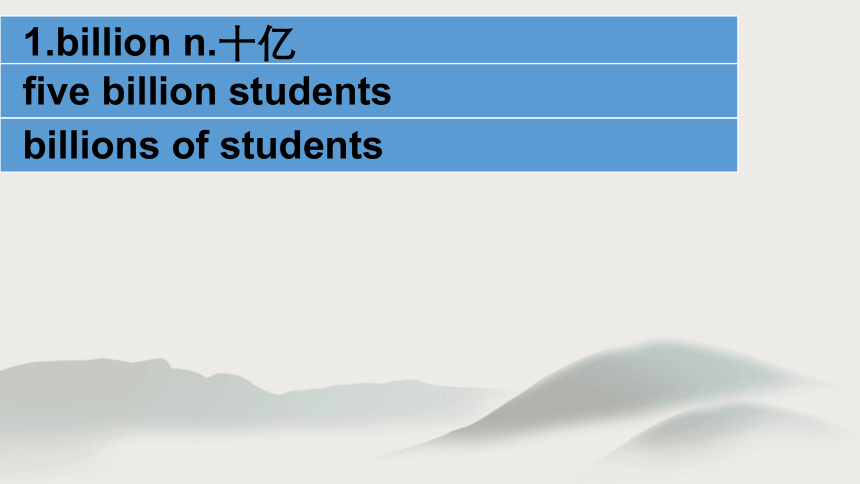
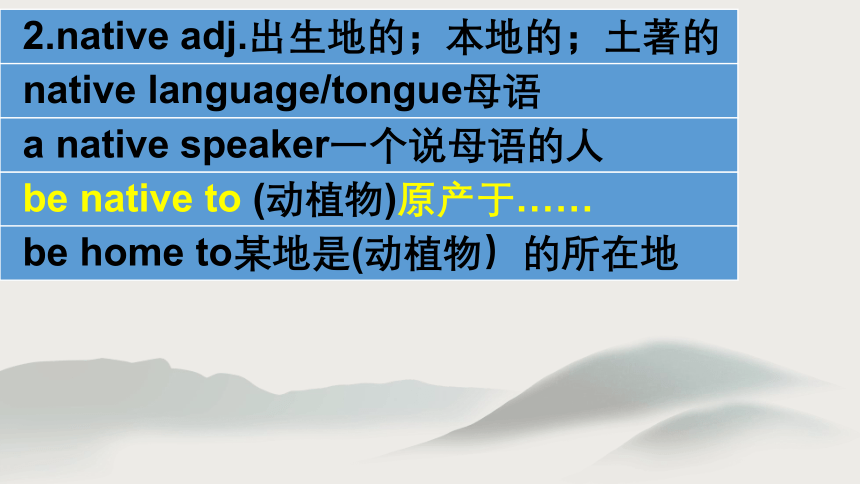
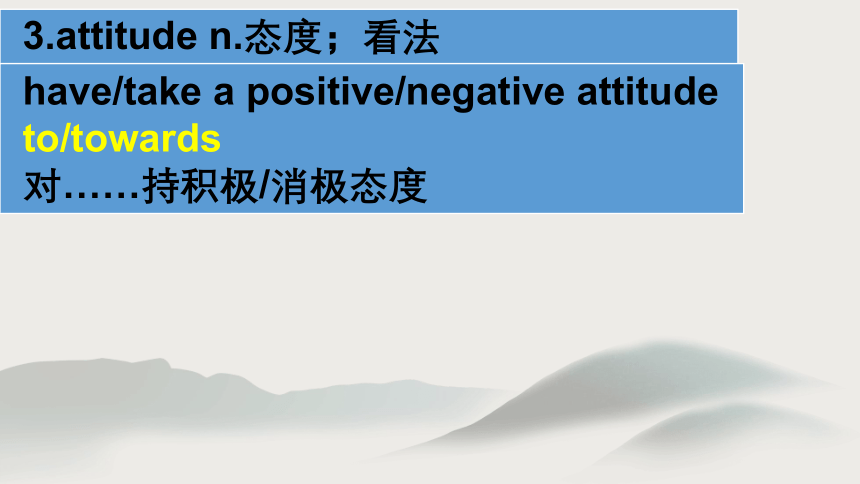
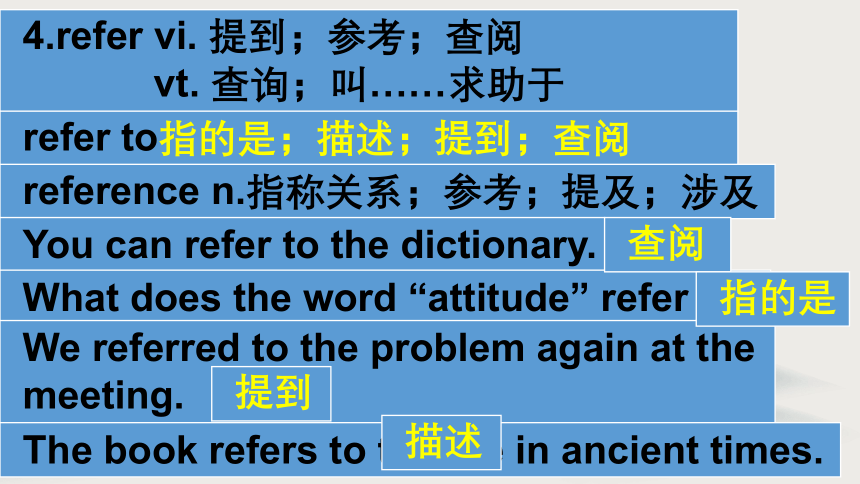
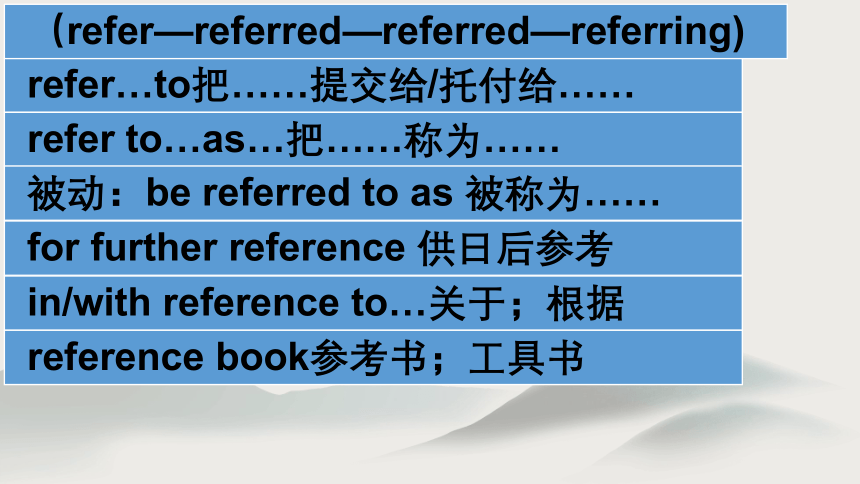
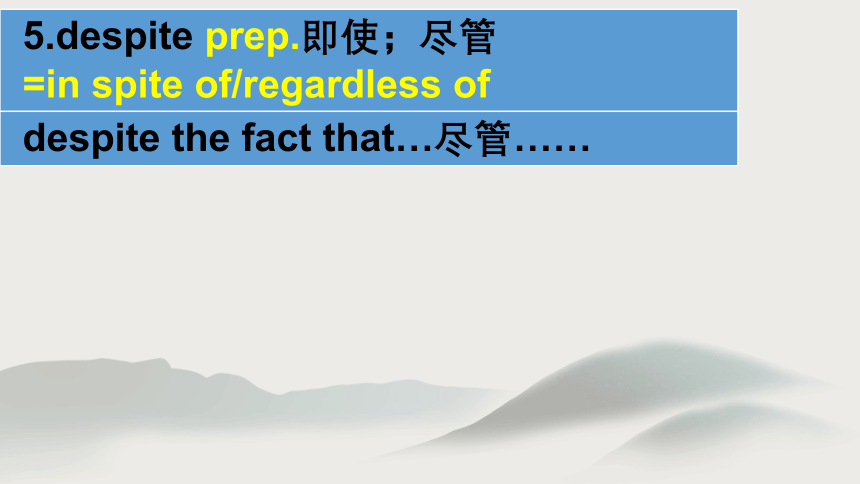
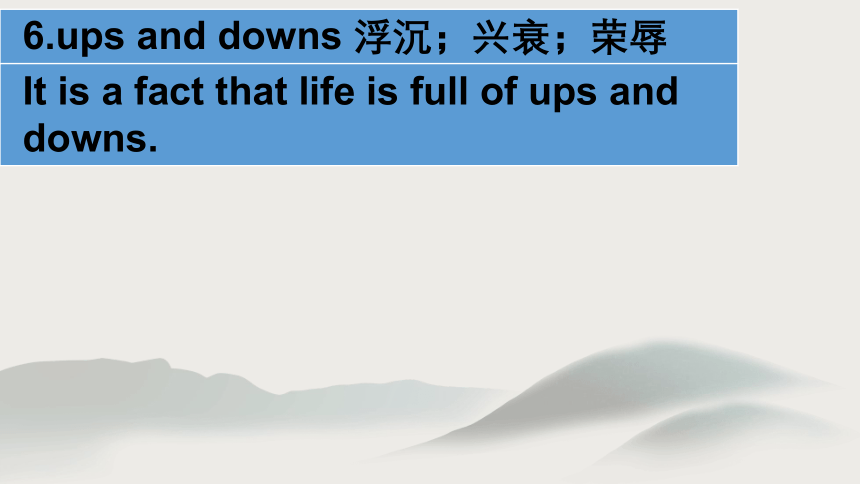
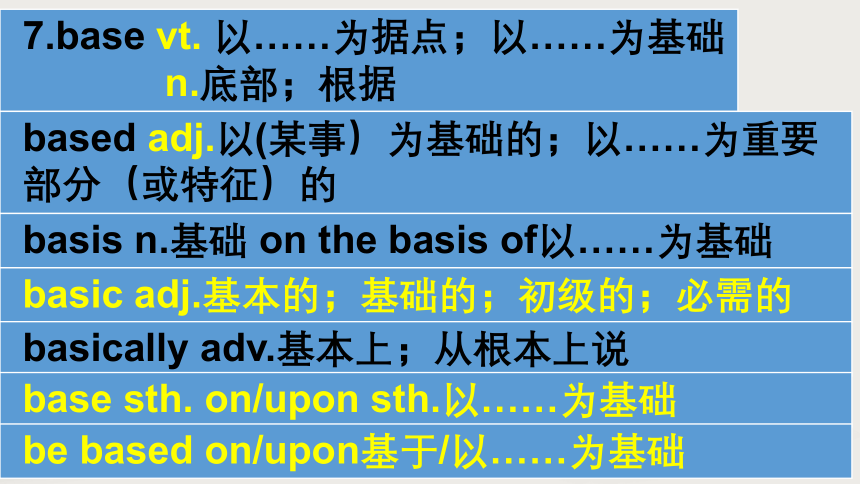
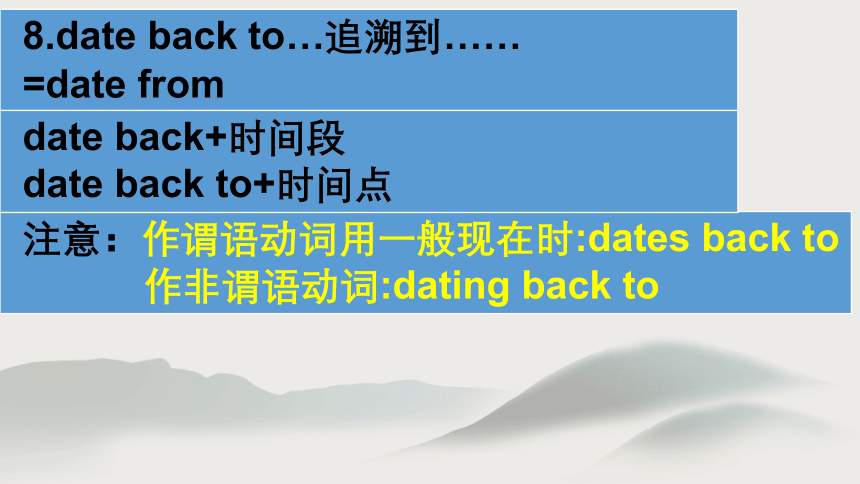
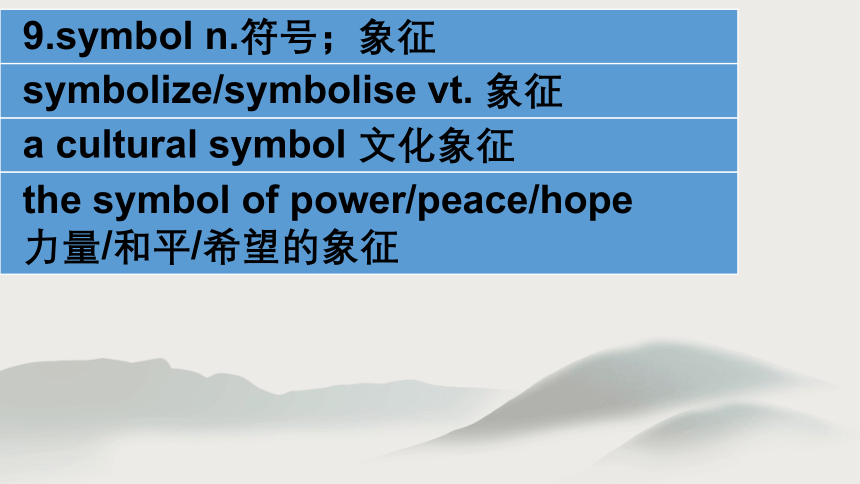
文档简介
(共94张PPT)
Unit 5 Languages around the World
Vocabulary Expansion
1.billion n.十亿
billions of students
five billion students
2.native adj.出生地的;本地的;土著的
native language/tongue母语
a native speaker一个说母语的人
be native to (动植物)原产于……
be home to某地是(动植物)的所在地
3.attitude n.态度;看法
have/take a positive/negative attitude to/towards
对……持积极/消极态度
4.refer vi. 提到;参考;查阅
vt. 查询;叫……求助于
refer to指的是;描述;提到;查阅
reference n.指称关系;参考;提及;涉及
You can refer to the dictionary.
What does the word “attitude” refer to
We referred to the problem again at the meeting.
The book refers to the life in ancient times.
查阅
指的是
提到
描述
refer…to把……提交给/托付给……
refer to…as…把……称为……
被动:be referred to as 被称为……
for further reference 供日后参考
in/with reference to…关于;根据
(refer—referred—referred—referring)
reference book参考书;工具书
5.despite prep.即使;尽管
=in spite of/regardless of
despite the fact that…尽管……
6.ups and downs 浮沉;兴衰;荣辱
It is a fact that life is full of ups and downs.
7.base vt. 以……为据点;以……为基础
n.底部;根据
based adj.以(某事)为基础的;以……为重要部分(或特征)的
basis n.基础 on the basis of以……为基础
basic adj.基本的;基础的;初级的;必需的
basically adv.基本上;从根本上说
base sth. on/upon sth.以……为基础
be based on/upon基于/以……为基础
8.date back to…追溯到……
=date from
注意:作谓语动词用一般现在时:dates back to
作非谓语动词:dating back to
date back+时间段
date back to+时间点
9.symbol n.符号;象征
a cultural symbol 文化象征
the symbol of power/peace/hope
力量/和平/希望的象征
symbolize/symbolise vt. 象征
10.variety n.(植物/语言等的)变体;异体;多样化
vary v.变化
various adj.各种各样的
=a variety of=varieties of各种各样的
vary from…to…从……到……不等
a variety of+名词复数+复数谓语 各种各样的
the variety of +名词复数+单数谓语……的多样性
11.major adj. 主要的;重要的;大的
n. 主修课程;主修学生
vi.主修;专门研究
majority n.大多数;大部分
a major factor/problem一个主要因素/问题
major in主修
the/a majority of大多数
12.means n.方式;方法;途径(单复数同形)
mean v.打算;意味着 adj.吝啬的;小气的
mean to do打算做……
mean doing 意味着做…
meaning n.意思;含义
meaningful adj.意味深长的
a means of=a way of一种……的方式
by this means/way用这种方法
by means of 利用……方式
by no means决不(位于句首时;句子部分倒装)
by all means 一定;务必;可以;当然行
13.classic adj.传统的;最优秀的;典型的
n. 经典作品;名著
classical adj.古典的
the classic works 经典作品
14. regard n.尊重;关注
vt. 把……视为;看待
regarding prep.关于= in/with regard to
regard…as…把……看作……
give one’s regards(问候)to sb.
代某人向某人问好
被动:be regarded as…被看作
have high regard for钦佩/推崇……
15. character n.文字;符号;角色;品质;特点
characteristic n.特点;特征
adj.典型的;独特的
Chinese characters汉字
cartoon characters卡通人物
a major/minor character主要/次要人物
16.global adj.全球的;全世界的
globe n.球体;球状物;地球仪
globally adv.全球地
global warming/economy/affairs
全球变暖/经济/事务
17.affair n.公共事务;事件;关系
political/foreign affairs 政治/外交事务
18.appreciate vt. 欣赏;重视;感激;领会
vi. 增值
appreciation n.感激;欣赏
appreciate (one’s) doing sth. 感激做某事
I’d appreciate it if…如果……我会非常感激
express one’s appreciation
表达某人的感激之情
19.struggle n.&vi 斗争;奋斗;搏斗
struggle/fight for 为……而斗争
struggle/fight with和……做斗争
struggle/fight against 为反对……而斗争
struggle to do sth. 尽力/挣扎做某事
struggle to one’s feet挣扎着站起来
It is a struggle for sb. to do sth.
对某人来说做某事是件难事。
20.point of view 观点;看法
在我看来:
from my point of view
=in my view
=in my opinion
=as far as I’m concerned
21.beg vt. 恳求;祈求;哀求
beg—begged—begged—begging
beggar n.乞丐
beg for sth.请求得到某物。
beg sb. for sth. 向某人祈求某物。
beg to do sth.请求做某事。
beg sb. (not) to do sth.
恳求某人(不)做某事。
22.equal n.同等的人;相等物(反:unequal)
adj.相同的;同样的
equally adv.平等地;同等地
equality n.平等;相等
be equal to sth./doing sth.与……平等/相等;胜任……
be without equal无与伦比
have no equal in (doing) sth.
在……方面无人能敌
equal sb./sth. in (doing) sth.
在(做)某事上比得过某人/物
23. demand n.要求;需求
vt.强烈要求;需要
demand sth. of/from sb.向某人要求某物
be in great/short demand需求大/小
meet/satisfy one’s demands满足某人需求
demand (of sb.) to do sth.要求某人做某事
demand that sb. (should) do sth.要求……
demanding adj.费时费力的;苛刻的;要求高的
后接虚拟语气的宾语从句的动词:
一坚持:insist
二命令:order, command
三建议:advise, suggest, propose, recommend
四要求:request, require, demand, desire
+敦促:urge
24. description n.描写(文字);形容
describe vt. 描写;描述
describe…as… 把……描述为……
beyond description难以形容;无法描述
25. relate vt. 联系;讲述
relate to 与……相关;涉及;谈到
related adj.相关的
relative adj.相应的 n.亲戚
relatively adv.相对地;相比较地
relation n.关系;联系
relationship n. 关系;联系
be related to…与……相关
背诵五分钟
五分钟后提问
连线。
be related to
be based on
be native to
have a positive attitude to
refer to
in spite of
date back to
appreciate doing sth.
a variety of
be equal to
A.原产于
B.与……相关
C.基于……
D.指的是;描述;查阅;提及
E.追溯到
F.各种各样的
G.与……相等
H.对……有一个积极的态度
I.尽管
J.感激做某事
填空。
1.I would appreciate ______ if you can help me with my English.
2.Students should have a proper attitude ____________ exams.
3.______ _____ _____(尽管) all the problems, he won the game.
4.The story ______ _____ _____(追溯到) three hundred years ago.
5.I want to taste ____ ____ ____(各种各样的) food in Beijing.
it
to/towards
In spite of
dates back to
a variety of
填空。
6.We learnt many Chinese ____________(汉字) yesterday.
7.He learns English _____ _____ _____(依靠)reading.
8.Tom ____ _____ __________(被认为)the most handsome boy in our class.
9.I appreciate your _________(help) me with my work.
10.__________________(无论哪里)you are, I will follow you.
characters
by means of
is/was regarded as
helping
No matter where
Reading and Thinking
请欣赏视频
两分钟快读文章,找出答案。
根据课文选择。
1.What is China widely known for
The many ups and downs in its history.
The Chinese writing system.
Its modern civilisation.
Its ancient civilisation.
根据课文选择。
2.Why is Emperor Qinshihuang mentioned in this passage
Because he created the Chinese writing system.
Because he encouraged people to use different forms of dialects.
Because he was the first emperor of the Qin Dynasty.
Because written Chinese became a unified language in his ruling period.
根据课文回答。
3.What has become an important part of Chinese culture in the development of Chinese characters
4.How do international students begin to appreciate China’s culture and history
Chinese calligraphy.
Through the amazing language.
Key Words and Phrases
1.be known/famous for
因……而出名
2.all the way through into
一直延续到
5.at the beginning
最初;起初
6.date back to
追溯到
3.modern times
现代;近代
4.ups and downs
浮沉;兴衰;荣辱
7.by the Shang Dynasty
到商朝时
Key Words and Phrases
8.well-developed
发达的;发育良好的
9.over the years
多年来
10.It/There was a time when…
曾经有一个时期……
11.geographically
adv.在地理上
12.lead to
导致;通向
Key Words and Phrases
14.in one direction
向一个方向
15.be of great importance
=be very important
非常重要
16.no matter where/what/who
无论哪里/什么/谁
13.unite the seven major states into one unified country
一统七国
Key Words and Phrases
17.written Chinese
汉字
18.be connected with
与……有联系
19.the classic works
经典作品;名著
20.the high regard for
推崇/钦佩……
21.in the development of
在……的发展中
22.(be) known/famous as
作为……而出名
23become an important part of
成为……一个重要的部分
Key Words and Phrases
24.play a/an (important/leading(主要的)/major) role/part in...
在……中起作用
25.global affairs
全球事务
26.an increasing number of
越来越多的
不规则动词
know
see
become
write
lead
begin
speak
read
knew
saw
became
wrote
led
began
spoke
read
known
seen
become
written
led
begun
spoken
read
课文缩写填空。
1.There are many reasons _________ this had been possible.
2.______ the beginning, written Chinese was a picture-based language.
3.By the Shang Dynasty, these symbols _________________(become) a well-developed writing system.
4. In the Qin Dynasty, the Chinese writing system began _____________(develop) in one direction.
why
At
had become
to develop
课文缩写填空。
5.The writing system was of great ________ (important) in uniting the Chinese people and culture.
6.The Chinese writing is an art form, _________(know) as Chinese calligraphy.
7.China’s present __________________(connect) with its past by written Chinese.
8.As China plays a greater role _____ global affairs, More and more people are beginning to appreciate China’s culture and history through this ____________(amaze) language.
importance
known
is connected
in
amazing
Grammar 1:by+时间(到……时为止)
By the Shang Dynasty, these symbols had become a well-developed writing system.
by+过去时间 主句:过去完成时(had done)
by+现在时间 主句:现在完成时(has/have done)
by+将来时间 主句:将来完成时(will have done)
Grammar 1:by+时间(到……时为止)
1.By now, he ______________(answer) nine questions.
2.By last term, we __________(finish) all the lessons.
3.By the end of next year, Tom ______________ (write) five books.
has answered
had finished
will have written
Grammar 2:a time when…(一段……的时期)
Over the years, the system developed into different forms, as it was a time when people were divided geographically…
It/This/That/There was a time when…那/这/那/曾经有一段……时期
It/This/That is/was the first/second time that…这/那是第一次/第二次……
从句用现在/过去完成时
Grammar 2:by+时间(到……时为止)
1.This was a time_______ the two countries were at war.
2.It was the first time______ I had visited the Great Wall.
3.It is the first time that I ____________(visit) the Great Wall.
when
that
have visited
Grammar 3:be of+ 形容词+名词
That writing system was of great importance in uniting the Chinese people and culture.
be of + adj. +n.=be + adv. + adj.
be of great importance=be very important
be of great use=be very useful
be of great help=be very helpful
be of great value=be very valuable
Grammar 3:be of+ 形容词+名词
1.The book is of great ___________ (important) for me.
2.Your advice was of great _______ (useful) to my work.
3.What the teacher said is very _________(help).
importance
use
helpful
Grammar 4:No matter where…
Even today, no matter where Chinese people live or what dialect they speak, they can still communicate in writing.
1.No matter where引导让步状语从句时可与wherever互换:
no matter where=wherever 无论哪里
no matter what=whatever 无论什么
no matter when=whenever无论何时
no matter who=whoever无论是谁
no matter how=however无论怎样
no matter which=whichever无论哪一个
e.g. No matter what/Whatever I say, she won’t listen.
No matter who/whoever you are, you should respect others.
Grammar 4:No matter where…
2.whatever/whichever/whoever…也可引导名词性从句
e.g. Whatever you did was right.
Whoever comes first will be the winner.
Grammar 4:No matter where…
1.I will find you _______________________ you are.
2. ________________________you need my help, you can call me.
3.____________________ difficult the problem is, we should hold a positive attitude to it.
4. ____________ my teacher said is good for me.
wherever/no matter where
However/no matter how
Whatever
Whenever/No matter when
Reading for Writing
Key Words and Phrases
1.post n.帖子
2.online forum 网络论坛
3.fill in the table填写表格
4.since是现在完成时(has/have done)/现在完成进行时(has/have been doing)的标志
主+has/have done since+主语+did
5.primary school小学
Key Words and Phrases
6.used to do sth. 过去常常做某事
be/get used to doing. 习惯于做某事
be used to do. 被用来做某事
7.get high marks/scores得高分
8.have trouble/difficulty with sth.
=have trouble/difficulty (in) doing sth.
做某事有困难
9.listen to听;听从
Key Words and Phrases
10.native English speakers
以英语为母语的人
11.catch-caught-caught抓住;捕捉;理解
12.few/a few +可数名词复数
几乎没有/有几个
little/a little+不可数名词
几乎没有/有一些
13.get the main idea掌握主旨;了解大意
Key Words and Phrases
14.English radio programmes 英语广播节目
15.native speakers说母语的人
16.experience the feeling of the language
体会语感
17.record n.记录
v.录制;录音
pare A with B 把A和B做比较
Key Words and Phrases
19.headache n.头疼;棘手的事
20. be polite (to)对……有礼貌
21. It is + adj. (for/of sb.) to do sth.
做某事(对某人来说)是……
22. Would you mind doing sth
你介意做某事吗?
mind doing sth.
介意做某事
Key Words and Phrases
23.much easier/even longer
much/even修饰比较级
24.depend on=rely on 依靠;依赖
25.bridge the gap消除距离
26.(be) senior to比……年龄大/级别高
27.proper adj.适当的;恰当的;正确的
properly adv.正确地;恰当地
不规则动词
get
catch
hear
have
make
keep
got
caught
heard
had
made
kept
got/gotten
caught
heard
had
made
kept
Name Problem Advice
Liu Wen Jia Xin’s advice:
Listen to English radio programmes
Jia Xin Li Rui’s advice:
Li Rui Your advice:
Trouble with listening to native English speakers
How to be polite in English
Remembering new vocabulary
Use short requests for close friends, use longer requests for people who are not so close, use more polite phrases for people senior to you
Create your own word bank
Grammar 1:listen to sb. doing/do sth.
When I listen to native English speakers talking in a video, I can catch only a few words.
listen to/hear(听)/look at/see/watch(看)/notice(留意)/feel(感觉到)
+sb. + doing sth. 某人正在做某事
+ do sth.某人做某事的全过程
Grammar 1:listen to sb. doing/do sth.
I saw Tom play a game in the garden yesterday.(强调看到玩游戏的全过程)
I saw Tom playing a game in the garden yesterday.(强调看到他正在玩游戏)
Grammar 2:how to do
My biggest headache is how to be polite in English.
“疑问词+to do不定式”结构
who/what/which/how/when/where to do可在句中作主语/表语/宾语
I don’t know what to eat.
The problem is where to go.
What to eat depends on you.
建议信模板
__________(日期:日月年/月日年)
Dear_______(对方姓名)
首段:描述问题
正文:具体建议123
尾段:表达愿望
Best wishes,
__________(你的姓名)
建议信模板
October 12 2012
Dear Xu Ting,
You wrote that you always feel lonely after school because your parents work in another city. I understand that you may have trouble in communicating with others and you must feel terrible.
Here are some advice for you. Firstly, I think you should talk with your parents by phone, because it is a good way for you to contact them. Secondly, why not join a club You can make new friends in the clubs. Last but not least, you’d better turn to the teachers for help, and they will offer some good advice for you.
I hope you will find these ideas useful and helpful. Besides, I’m sure you will not feel lonely any more if you can listen to my advice.
Best wishes,
Tom
作业:
练习册Reading for Writing
应用领悟,今晚交
Discovering Useful Structures
定从复习:
1.定义
2.三要素
3.做题口诀(先看先行词……)
4.关系代词关系副词
5.特殊用法
用that不用which(你唯一的疑表最不人物)
用which不用that(that用法真有趣……)
用who不用that(指人的不定代词)
关系副词 先行词 关系词在从句中所作成分
When=介词(in/on/at/during)+which 时间名词 时间状语
Where=介词(in/at/on)+which 地点名词 地点状语
Why=for which Reason 原因状语
若从句不缺成分,则用关系副词
where的先行词:position/point/case/stage(阶段)/situation
The children are at the stage where they like playing computer games.
用when,why, where填空。
1.This is the reason ___________ I did the job.
2.The factory _______ his father works is in the city.
3.I still remember the day _______ I first came to Beijing.
4.This is the house _______ I lived two years ago.
5.Tell me the reason _______ you left Shanghai.
6.I remember the days ________ I lived there.
why
where
when
where
why
when
用介词+which填空。
1.This is the reason why I did the job.
2.The factory where his father works is in the city.
3.I still remember the day when I first came to Beijing.
4.This is the house where I lived two years ago.
5.Tell me the reason why you left Shanghai.
6.I remember the days when I lived there.
for which
in which
on which
in which
for which
during which
介词+关系代词:
介词+which指物
介词+whom指人
介词+ whose + n. ……的
用which/whom/whose填空。
1.This is my computer, without _______ I can’t work.
2.This is the man to _______ I spoke.
3.She’s the girl in _______ bag I found my money.
4.The children, all of _______ played football, are tired.
which
whom
whose
whom
介词怎么选?
介词的选择:“一先二动三意义”
一先:根据先行词搭配来确定;
I never forget the day _________which I came to this school.
二动:根据从句谓语动词的搭配来确定;
This is the book ______ which I paid.
三意义:根据从句表达意义来确定。
That is my pen, __________which I can’t write.
on
for
without
用介词+which/whom/whose填空。
1.This is the house ____ ____ the meeting will be held.
2.This is my computer, ____ _____ I can’t work.
3.Tom is the boy ____ ____ I can turn for help.
4.I want to thank my father, _____ ____ help I would never succeed.
in which
without which
to whom
without whose
特殊情况:
1.time固定句型:
It/This/That/There was a time when…那/这/那/曾经有一段……时期
It/This/That is/was the first/second time that…这/那是第一次/第二次……
从句用现在/过去完成时
It’s not the first time_______ I have visited Beijing.
There was a time ______ I was very poor.
that
when
特殊情况:
2.the way做先行词
从句中缺主/宾/表语,用that/which//
从句缺状语,用that/in which//
Can you tell me the way ________ you use to solve the problem.
That’s the way__________ you talk to your mother.
that/which//
that/in which//
特殊情况:
3.which与as的在非限定从中区别:
which引导的从句位于主句之后,译为“这一点,这件事”,可指代前面整个句子;而as引导的从句可位于主句前/主句后/主句中,译为“正如;就像”
as you can see如你所见
as is well known众所周知=as is known to us all
as we had expected正如我们所预料的那样
as often happens正如经常发生的那样
as is mentioned above正如上面提到的那样
as I remember正如我所记得的那样
as is often the case情况常常如此
特殊情况:
4.the same…that指同一个人/物
the same…as指同一种类的人/物
I like the same pen that you use yesterday.(同一支)
I like the same pen as you use yesterday.(同一种类)
5.such/so…that “如此……以至于……”引导结果状从
such/so…as “像……这种的/那样的”引导定从
Lulu is so beautiful that everyone loves her.
English is not so difficult as you imagine.
注意:
1.“名词/代词/数词+of+which/whom/whose”通常指代整体的一部分,通常在从句中做主语;…of which指物;…of whom指人;…of whose指…的。
This is our school, the building of which is very tall.
There are 50 girls, some of whom come from Shanghai.
That is Lily, five of whose books are very popular.
注意:
2.定从中的介词可前可后:
He is the man to whom I can turn for help.
=He is the man whom/who I can turn to for help.
3.一些含有介词的固定短语不能拆开前移,例如:
listen to/look for/care for/take care of/hear from/hear of…
This is the book which/that Lulu is looking for.
4.限制性定语从句/非限制性定语从句(有无逗号)
I like the story which/that is very interesting.(限制)
I like the story, which is very interesting.(非限)
单句语法填空。
1.I want to thank Tom, without _________ I would never have made such great progress.
2.Can you tell me the reason ___________ they didn’t attend the meeting
3.We will put off the picnic in the park until next week _________ the weather may be better.
4.He wrote a letter __________ he explained what had happened.
whom
why
when
where
单句语法填空。
5.We have come to a point ________ everyone has different opinions and it is difficult to reach an agreement.
6.I bought a dozen eggs, six of_______ were broken when I dropped the box.
7.Some experts think reading is the fundamental skill upon ______ school education depends.
8.Who is the girl _____ whom you just shook hands
where
which
which
with
定从总练习。
1._______ is often the case, we don’t agree with you.
2.All _______ is needed is some water.
3.That is the hotel _______ we stayed last year.
4. This is the reason _______ we made Tom our monitor.
5.He told the same story _______ I told.
6.That is the very book _______ I am looking for.
7.I don’t like the way _____________ you speak to your teacher.
8.This is the place ____________ I was born.
As
that
where
why
that
that
that/in which//
where/in which
定从关系代词复习:
1.定义
2.三要素
3.做题口诀(先看先行词……)
4.关系代词关系副词
5.特殊用法
用that不用which(你唯一的疑表最不人物)
用which不用that(that用法真有趣……)
用who不用that(指人的不定代词)
定从关系副词复习:
1.when/where/why=介词+which
2.介词+which/whom/whose
3.介词选择:一先二动三意义
4.特殊情况:
time固定句型
way做先行词
which/as区别(非限定从中)
the same…as/that区别
so/such…as/that区别
5.注意事项:
名词/代词/数词+of which/whom/whose表示整体中的一部分
介词可前可后
固定短语不能拆开
限制性/非限制性定从区别
Homework
2.单词三英三汉,会背。
3. 练习册。
4. 周检测+单词页子。
5. 练习册。
6.作文。
7. 练习册+小本。
8.默写。
1.单词三英三汉,会背。
Thank You
Unit 5 Languages around the World
Vocabulary Expansion
1.billion n.十亿
billions of students
five billion students
2.native adj.出生地的;本地的;土著的
native language/tongue母语
a native speaker一个说母语的人
be native to (动植物)原产于……
be home to某地是(动植物)的所在地
3.attitude n.态度;看法
have/take a positive/negative attitude to/towards
对……持积极/消极态度
4.refer vi. 提到;参考;查阅
vt. 查询;叫……求助于
refer to指的是;描述;提到;查阅
reference n.指称关系;参考;提及;涉及
You can refer to the dictionary.
What does the word “attitude” refer to
We referred to the problem again at the meeting.
The book refers to the life in ancient times.
查阅
指的是
提到
描述
refer…to把……提交给/托付给……
refer to…as…把……称为……
被动:be referred to as 被称为……
for further reference 供日后参考
in/with reference to…关于;根据
(refer—referred—referred—referring)
reference book参考书;工具书
5.despite prep.即使;尽管
=in spite of/regardless of
despite the fact that…尽管……
6.ups and downs 浮沉;兴衰;荣辱
It is a fact that life is full of ups and downs.
7.base vt. 以……为据点;以……为基础
n.底部;根据
based adj.以(某事)为基础的;以……为重要部分(或特征)的
basis n.基础 on the basis of以……为基础
basic adj.基本的;基础的;初级的;必需的
basically adv.基本上;从根本上说
base sth. on/upon sth.以……为基础
be based on/upon基于/以……为基础
8.date back to…追溯到……
=date from
注意:作谓语动词用一般现在时:dates back to
作非谓语动词:dating back to
date back+时间段
date back to+时间点
9.symbol n.符号;象征
a cultural symbol 文化象征
the symbol of power/peace/hope
力量/和平/希望的象征
symbolize/symbolise vt. 象征
10.variety n.(植物/语言等的)变体;异体;多样化
vary v.变化
various adj.各种各样的
=a variety of=varieties of各种各样的
vary from…to…从……到……不等
a variety of+名词复数+复数谓语 各种各样的
the variety of +名词复数+单数谓语……的多样性
11.major adj. 主要的;重要的;大的
n. 主修课程;主修学生
vi.主修;专门研究
majority n.大多数;大部分
a major factor/problem一个主要因素/问题
major in主修
the/a majority of大多数
12.means n.方式;方法;途径(单复数同形)
mean v.打算;意味着 adj.吝啬的;小气的
mean to do打算做……
mean doing 意味着做…
meaning n.意思;含义
meaningful adj.意味深长的
a means of=a way of一种……的方式
by this means/way用这种方法
by means of 利用……方式
by no means决不(位于句首时;句子部分倒装)
by all means 一定;务必;可以;当然行
13.classic adj.传统的;最优秀的;典型的
n. 经典作品;名著
classical adj.古典的
the classic works 经典作品
14. regard n.尊重;关注
vt. 把……视为;看待
regarding prep.关于= in/with regard to
regard…as…把……看作……
give one’s regards(问候)to sb.
代某人向某人问好
被动:be regarded as…被看作
have high regard for钦佩/推崇……
15. character n.文字;符号;角色;品质;特点
characteristic n.特点;特征
adj.典型的;独特的
Chinese characters汉字
cartoon characters卡通人物
a major/minor character主要/次要人物
16.global adj.全球的;全世界的
globe n.球体;球状物;地球仪
globally adv.全球地
global warming/economy/affairs
全球变暖/经济/事务
17.affair n.公共事务;事件;关系
political/foreign affairs 政治/外交事务
18.appreciate vt. 欣赏;重视;感激;领会
vi. 增值
appreciation n.感激;欣赏
appreciate (one’s) doing sth. 感激做某事
I’d appreciate it if…如果……我会非常感激
express one’s appreciation
表达某人的感激之情
19.struggle n.&vi 斗争;奋斗;搏斗
struggle/fight for 为……而斗争
struggle/fight with和……做斗争
struggle/fight against 为反对……而斗争
struggle to do sth. 尽力/挣扎做某事
struggle to one’s feet挣扎着站起来
It is a struggle for sb. to do sth.
对某人来说做某事是件难事。
20.point of view 观点;看法
在我看来:
from my point of view
=in my view
=in my opinion
=as far as I’m concerned
21.beg vt. 恳求;祈求;哀求
beg—begged—begged—begging
beggar n.乞丐
beg for sth.请求得到某物。
beg sb. for sth. 向某人祈求某物。
beg to do sth.请求做某事。
beg sb. (not) to do sth.
恳求某人(不)做某事。
22.equal n.同等的人;相等物(反:unequal)
adj.相同的;同样的
equally adv.平等地;同等地
equality n.平等;相等
be equal to sth./doing sth.与……平等/相等;胜任……
be without equal无与伦比
have no equal in (doing) sth.
在……方面无人能敌
equal sb./sth. in (doing) sth.
在(做)某事上比得过某人/物
23. demand n.要求;需求
vt.强烈要求;需要
demand sth. of/from sb.向某人要求某物
be in great/short demand需求大/小
meet/satisfy one’s demands满足某人需求
demand (of sb.) to do sth.要求某人做某事
demand that sb. (should) do sth.要求……
demanding adj.费时费力的;苛刻的;要求高的
后接虚拟语气的宾语从句的动词:
一坚持:insist
二命令:order, command
三建议:advise, suggest, propose, recommend
四要求:request, require, demand, desire
+敦促:urge
24. description n.描写(文字);形容
describe vt. 描写;描述
describe…as… 把……描述为……
beyond description难以形容;无法描述
25. relate vt. 联系;讲述
relate to 与……相关;涉及;谈到
related adj.相关的
relative adj.相应的 n.亲戚
relatively adv.相对地;相比较地
relation n.关系;联系
relationship n. 关系;联系
be related to…与……相关
背诵五分钟
五分钟后提问
连线。
be related to
be based on
be native to
have a positive attitude to
refer to
in spite of
date back to
appreciate doing sth.
a variety of
be equal to
A.原产于
B.与……相关
C.基于……
D.指的是;描述;查阅;提及
E.追溯到
F.各种各样的
G.与……相等
H.对……有一个积极的态度
I.尽管
J.感激做某事
填空。
1.I would appreciate ______ if you can help me with my English.
2.Students should have a proper attitude ____________ exams.
3.______ _____ _____(尽管) all the problems, he won the game.
4.The story ______ _____ _____(追溯到) three hundred years ago.
5.I want to taste ____ ____ ____(各种各样的) food in Beijing.
it
to/towards
In spite of
dates back to
a variety of
填空。
6.We learnt many Chinese ____________(汉字) yesterday.
7.He learns English _____ _____ _____(依靠)reading.
8.Tom ____ _____ __________(被认为)the most handsome boy in our class.
9.I appreciate your _________(help) me with my work.
10.__________________(无论哪里)you are, I will follow you.
characters
by means of
is/was regarded as
helping
No matter where
Reading and Thinking
请欣赏视频
两分钟快读文章,找出答案。
根据课文选择。
1.What is China widely known for
The many ups and downs in its history.
The Chinese writing system.
Its modern civilisation.
Its ancient civilisation.
根据课文选择。
2.Why is Emperor Qinshihuang mentioned in this passage
Because he created the Chinese writing system.
Because he encouraged people to use different forms of dialects.
Because he was the first emperor of the Qin Dynasty.
Because written Chinese became a unified language in his ruling period.
根据课文回答。
3.What has become an important part of Chinese culture in the development of Chinese characters
4.How do international students begin to appreciate China’s culture and history
Chinese calligraphy.
Through the amazing language.
Key Words and Phrases
1.be known/famous for
因……而出名
2.all the way through into
一直延续到
5.at the beginning
最初;起初
6.date back to
追溯到
3.modern times
现代;近代
4.ups and downs
浮沉;兴衰;荣辱
7.by the Shang Dynasty
到商朝时
Key Words and Phrases
8.well-developed
发达的;发育良好的
9.over the years
多年来
10.It/There was a time when…
曾经有一个时期……
11.geographically
adv.在地理上
12.lead to
导致;通向
Key Words and Phrases
14.in one direction
向一个方向
15.be of great importance
=be very important
非常重要
16.no matter where/what/who
无论哪里/什么/谁
13.unite the seven major states into one unified country
一统七国
Key Words and Phrases
17.written Chinese
汉字
18.be connected with
与……有联系
19.the classic works
经典作品;名著
20.the high regard for
推崇/钦佩……
21.in the development of
在……的发展中
22.(be) known/famous as
作为……而出名
23become an important part of
成为……一个重要的部分
Key Words and Phrases
24.play a/an (important/leading(主要的)/major) role/part in...
在……中起作用
25.global affairs
全球事务
26.an increasing number of
越来越多的
不规则动词
know
see
become
write
lead
begin
speak
read
knew
saw
became
wrote
led
began
spoke
read
known
seen
become
written
led
begun
spoken
read
课文缩写填空。
1.There are many reasons _________ this had been possible.
2.______ the beginning, written Chinese was a picture-based language.
3.By the Shang Dynasty, these symbols _________________(become) a well-developed writing system.
4. In the Qin Dynasty, the Chinese writing system began _____________(develop) in one direction.
why
At
had become
to develop
课文缩写填空。
5.The writing system was of great ________ (important) in uniting the Chinese people and culture.
6.The Chinese writing is an art form, _________(know) as Chinese calligraphy.
7.China’s present __________________(connect) with its past by written Chinese.
8.As China plays a greater role _____ global affairs, More and more people are beginning to appreciate China’s culture and history through this ____________(amaze) language.
importance
known
is connected
in
amazing
Grammar 1:by+时间(到……时为止)
By the Shang Dynasty, these symbols had become a well-developed writing system.
by+过去时间 主句:过去完成时(had done)
by+现在时间 主句:现在完成时(has/have done)
by+将来时间 主句:将来完成时(will have done)
Grammar 1:by+时间(到……时为止)
1.By now, he ______________(answer) nine questions.
2.By last term, we __________(finish) all the lessons.
3.By the end of next year, Tom ______________ (write) five books.
has answered
had finished
will have written
Grammar 2:a time when…(一段……的时期)
Over the years, the system developed into different forms, as it was a time when people were divided geographically…
It/This/That/There was a time when…那/这/那/曾经有一段……时期
It/This/That is/was the first/second time that…这/那是第一次/第二次……
从句用现在/过去完成时
Grammar 2:by+时间(到……时为止)
1.This was a time_______ the two countries were at war.
2.It was the first time______ I had visited the Great Wall.
3.It is the first time that I ____________(visit) the Great Wall.
when
that
have visited
Grammar 3:be of+ 形容词+名词
That writing system was of great importance in uniting the Chinese people and culture.
be of + adj. +n.=be + adv. + adj.
be of great importance=be very important
be of great use=be very useful
be of great help=be very helpful
be of great value=be very valuable
Grammar 3:be of+ 形容词+名词
1.The book is of great ___________ (important) for me.
2.Your advice was of great _______ (useful) to my work.
3.What the teacher said is very _________(help).
importance
use
helpful
Grammar 4:No matter where…
Even today, no matter where Chinese people live or what dialect they speak, they can still communicate in writing.
1.No matter where引导让步状语从句时可与wherever互换:
no matter where=wherever 无论哪里
no matter what=whatever 无论什么
no matter when=whenever无论何时
no matter who=whoever无论是谁
no matter how=however无论怎样
no matter which=whichever无论哪一个
e.g. No matter what/Whatever I say, she won’t listen.
No matter who/whoever you are, you should respect others.
Grammar 4:No matter where…
2.whatever/whichever/whoever…也可引导名词性从句
e.g. Whatever you did was right.
Whoever comes first will be the winner.
Grammar 4:No matter where…
1.I will find you _______________________ you are.
2. ________________________you need my help, you can call me.
3.____________________ difficult the problem is, we should hold a positive attitude to it.
4. ____________ my teacher said is good for me.
wherever/no matter where
However/no matter how
Whatever
Whenever/No matter when
Reading for Writing
Key Words and Phrases
1.post n.帖子
2.online forum 网络论坛
3.fill in the table填写表格
4.since是现在完成时(has/have done)/现在完成进行时(has/have been doing)的标志
主+has/have done since+主语+did
5.primary school小学
Key Words and Phrases
6.used to do sth. 过去常常做某事
be/get used to doing. 习惯于做某事
be used to do. 被用来做某事
7.get high marks/scores得高分
8.have trouble/difficulty with sth.
=have trouble/difficulty (in) doing sth.
做某事有困难
9.listen to听;听从
Key Words and Phrases
10.native English speakers
以英语为母语的人
11.catch-caught-caught抓住;捕捉;理解
12.few/a few +可数名词复数
几乎没有/有几个
little/a little+不可数名词
几乎没有/有一些
13.get the main idea掌握主旨;了解大意
Key Words and Phrases
14.English radio programmes 英语广播节目
15.native speakers说母语的人
16.experience the feeling of the language
体会语感
17.record n.记录
v.录制;录音
pare A with B 把A和B做比较
Key Words and Phrases
19.headache n.头疼;棘手的事
20. be polite (to)对……有礼貌
21. It is + adj. (for/of sb.) to do sth.
做某事(对某人来说)是……
22. Would you mind doing sth
你介意做某事吗?
mind doing sth.
介意做某事
Key Words and Phrases
23.much easier/even longer
much/even修饰比较级
24.depend on=rely on 依靠;依赖
25.bridge the gap消除距离
26.(be) senior to比……年龄大/级别高
27.proper adj.适当的;恰当的;正确的
properly adv.正确地;恰当地
不规则动词
get
catch
hear
have
make
keep
got
caught
heard
had
made
kept
got/gotten
caught
heard
had
made
kept
Name Problem Advice
Liu Wen Jia Xin’s advice:
Listen to English radio programmes
Jia Xin Li Rui’s advice:
Li Rui Your advice:
Trouble with listening to native English speakers
How to be polite in English
Remembering new vocabulary
Use short requests for close friends, use longer requests for people who are not so close, use more polite phrases for people senior to you
Create your own word bank
Grammar 1:listen to sb. doing/do sth.
When I listen to native English speakers talking in a video, I can catch only a few words.
listen to/hear(听)/look at/see/watch(看)/notice(留意)/feel(感觉到)
+sb. + doing sth. 某人正在做某事
+ do sth.某人做某事的全过程
Grammar 1:listen to sb. doing/do sth.
I saw Tom play a game in the garden yesterday.(强调看到玩游戏的全过程)
I saw Tom playing a game in the garden yesterday.(强调看到他正在玩游戏)
Grammar 2:how to do
My biggest headache is how to be polite in English.
“疑问词+to do不定式”结构
who/what/which/how/when/where to do可在句中作主语/表语/宾语
I don’t know what to eat.
The problem is where to go.
What to eat depends on you.
建议信模板
__________(日期:日月年/月日年)
Dear_______(对方姓名)
首段:描述问题
正文:具体建议123
尾段:表达愿望
Best wishes,
__________(你的姓名)
建议信模板
October 12 2012
Dear Xu Ting,
You wrote that you always feel lonely after school because your parents work in another city. I understand that you may have trouble in communicating with others and you must feel terrible.
Here are some advice for you. Firstly, I think you should talk with your parents by phone, because it is a good way for you to contact them. Secondly, why not join a club You can make new friends in the clubs. Last but not least, you’d better turn to the teachers for help, and they will offer some good advice for you.
I hope you will find these ideas useful and helpful. Besides, I’m sure you will not feel lonely any more if you can listen to my advice.
Best wishes,
Tom
作业:
练习册Reading for Writing
应用领悟,今晚交
Discovering Useful Structures
定从复习:
1.定义
2.三要素
3.做题口诀(先看先行词……)
4.关系代词关系副词
5.特殊用法
用that不用which(你唯一的疑表最不人物)
用which不用that(that用法真有趣……)
用who不用that(指人的不定代词)
关系副词 先行词 关系词在从句中所作成分
When=介词(in/on/at/during)+which 时间名词 时间状语
Where=介词(in/at/on)+which 地点名词 地点状语
Why=for which Reason 原因状语
若从句不缺成分,则用关系副词
where的先行词:position/point/case/stage(阶段)/situation
The children are at the stage where they like playing computer games.
用when,why, where填空。
1.This is the reason ___________ I did the job.
2.The factory _______ his father works is in the city.
3.I still remember the day _______ I first came to Beijing.
4.This is the house _______ I lived two years ago.
5.Tell me the reason _______ you left Shanghai.
6.I remember the days ________ I lived there.
why
where
when
where
why
when
用介词+which填空。
1.This is the reason why I did the job.
2.The factory where his father works is in the city.
3.I still remember the day when I first came to Beijing.
4.This is the house where I lived two years ago.
5.Tell me the reason why you left Shanghai.
6.I remember the days when I lived there.
for which
in which
on which
in which
for which
during which
介词+关系代词:
介词+which指物
介词+whom指人
介词+ whose + n. ……的
用which/whom/whose填空。
1.This is my computer, without _______ I can’t work.
2.This is the man to _______ I spoke.
3.She’s the girl in _______ bag I found my money.
4.The children, all of _______ played football, are tired.
which
whom
whose
whom
介词怎么选?
介词的选择:“一先二动三意义”
一先:根据先行词搭配来确定;
I never forget the day _________which I came to this school.
二动:根据从句谓语动词的搭配来确定;
This is the book ______ which I paid.
三意义:根据从句表达意义来确定。
That is my pen, __________which I can’t write.
on
for
without
用介词+which/whom/whose填空。
1.This is the house ____ ____ the meeting will be held.
2.This is my computer, ____ _____ I can’t work.
3.Tom is the boy ____ ____ I can turn for help.
4.I want to thank my father, _____ ____ help I would never succeed.
in which
without which
to whom
without whose
特殊情况:
1.time固定句型:
It/This/That/There was a time when…那/这/那/曾经有一段……时期
It/This/That is/was the first/second time that…这/那是第一次/第二次……
从句用现在/过去完成时
It’s not the first time_______ I have visited Beijing.
There was a time ______ I was very poor.
that
when
特殊情况:
2.the way做先行词
从句中缺主/宾/表语,用that/which//
从句缺状语,用that/in which//
Can you tell me the way ________ you use to solve the problem.
That’s the way__________ you talk to your mother.
that/which//
that/in which//
特殊情况:
3.which与as的在非限定从中区别:
which引导的从句位于主句之后,译为“这一点,这件事”,可指代前面整个句子;而as引导的从句可位于主句前/主句后/主句中,译为“正如;就像”
as you can see如你所见
as is well known众所周知=as is known to us all
as we had expected正如我们所预料的那样
as often happens正如经常发生的那样
as is mentioned above正如上面提到的那样
as I remember正如我所记得的那样
as is often the case情况常常如此
特殊情况:
4.the same…that指同一个人/物
the same…as指同一种类的人/物
I like the same pen that you use yesterday.(同一支)
I like the same pen as you use yesterday.(同一种类)
5.such/so…that “如此……以至于……”引导结果状从
such/so…as “像……这种的/那样的”引导定从
Lulu is so beautiful that everyone loves her.
English is not so difficult as you imagine.
注意:
1.“名词/代词/数词+of+which/whom/whose”通常指代整体的一部分,通常在从句中做主语;…of which指物;…of whom指人;…of whose指…的。
This is our school, the building of which is very tall.
There are 50 girls, some of whom come from Shanghai.
That is Lily, five of whose books are very popular.
注意:
2.定从中的介词可前可后:
He is the man to whom I can turn for help.
=He is the man whom/who I can turn to for help.
3.一些含有介词的固定短语不能拆开前移,例如:
listen to/look for/care for/take care of/hear from/hear of…
This is the book which/that Lulu is looking for.
4.限制性定语从句/非限制性定语从句(有无逗号)
I like the story which/that is very interesting.(限制)
I like the story, which is very interesting.(非限)
单句语法填空。
1.I want to thank Tom, without _________ I would never have made such great progress.
2.Can you tell me the reason ___________ they didn’t attend the meeting
3.We will put off the picnic in the park until next week _________ the weather may be better.
4.He wrote a letter __________ he explained what had happened.
whom
why
when
where
单句语法填空。
5.We have come to a point ________ everyone has different opinions and it is difficult to reach an agreement.
6.I bought a dozen eggs, six of_______ were broken when I dropped the box.
7.Some experts think reading is the fundamental skill upon ______ school education depends.
8.Who is the girl _____ whom you just shook hands
where
which
which
with
定从总练习。
1._______ is often the case, we don’t agree with you.
2.All _______ is needed is some water.
3.That is the hotel _______ we stayed last year.
4. This is the reason _______ we made Tom our monitor.
5.He told the same story _______ I told.
6.That is the very book _______ I am looking for.
7.I don’t like the way _____________ you speak to your teacher.
8.This is the place ____________ I was born.
As
that
where
why
that
that
that/in which//
where/in which
定从关系代词复习:
1.定义
2.三要素
3.做题口诀(先看先行词……)
4.关系代词关系副词
5.特殊用法
用that不用which(你唯一的疑表最不人物)
用which不用that(that用法真有趣……)
用who不用that(指人的不定代词)
定从关系副词复习:
1.when/where/why=介词+which
2.介词+which/whom/whose
3.介词选择:一先二动三意义
4.特殊情况:
time固定句型
way做先行词
which/as区别(非限定从中)
the same…as/that区别
so/such…as/that区别
5.注意事项:
名词/代词/数词+of which/whom/whose表示整体中的一部分
介词可前可后
固定短语不能拆开
限制性/非限制性定从区别
Homework
2.单词三英三汉,会背。
3. 练习册。
4. 周检测+单词页子。
5. 练习册。
6.作文。
7. 练习册+小本。
8.默写。
1.单词三英三汉,会背。
Thank You
